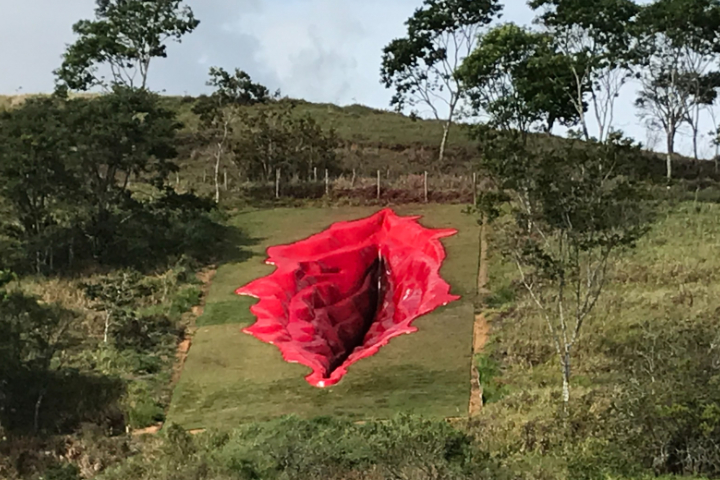
Vulva Sculpture On A Hillside Incites Outrage In Brazil

A huge vulva sculpture in Brazil has incited enormous public controversy.
The 33 metre high concrete crimson vulva sculpture titled Diva has been erected on a hillside, within a sculpture park in the northeastern state of Pernambuco, by Brazilian artist Juliana Notari. She worked on the sculpture for 11 months with the help of a crew of 20 people. The hand-made sculpture is 16 metres wide and 6 metres deep. The Facebook post by Juliana Notari also explained why an excavator would have been unsuitable for the creation of Diva, as it would not have “accurately carve[d out] the reliefs she needed.”
There has been widespread criticism regarding her artwork on Facebook.
“After a lifetime of viewing phallic symbols everywhere, a little vulva can’t hurt,” read one Facebook comment.
While some applauded her work, others claimed that it looked “ridiculous” in that setting, while some others criticised Diva for its “inaccuracy in colour.”
Notari’s work engages diverse media such as installation, performance, photography, drawing, objects, and videos in a multidisciplinary approach. Curator and critic Clarissa Diniz characterised Notari as part of a “small group of artists whose work refers less to art and more to human nature.”
According to a Facebook post by NowThis Her, Diva intends to“question the relationship between nature and culture in our phallocentric and anthropocentric western society.” Notari’s work characterises “gender issues from a female perspective” which have become increasingly urgent. The increasingly “urgent issues” could be a reference to Brazil’s political climate under President Jair Bolsonaro. In December 2020, Brazil’s rightwing President expressed his criticism about Argentina’s decision to legalise abortion.
“If it depends on me and my administration, abortion will never be approved on our soil,” Bolsonaro commented. “We will always fight to protect the rights of the innocent!”
Despite women’s achievements in the political arena, efforts at achieving gender equality in Brazil are still undergoing. According to The Brazilian Report, Brazil has an alarming femicide rate which increased by 4% in 2018. Under the Brazilian Penal Code of 2015, femicide, a subcategory of murder, refers to “murder of a woman as a consequence of her gender, whether due to discrimination or contempt, or in cases of domestic violence.” Notari’s work aims to address these critical issues to be able to “live on this planet in a less unequal and catastrophic society.”









